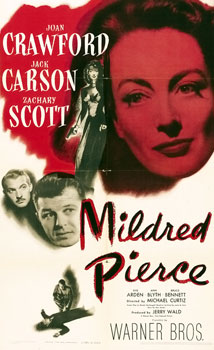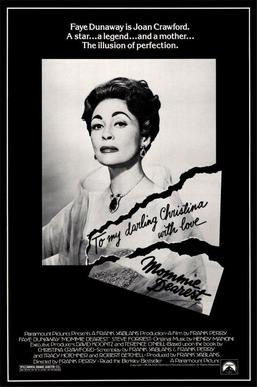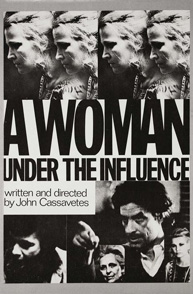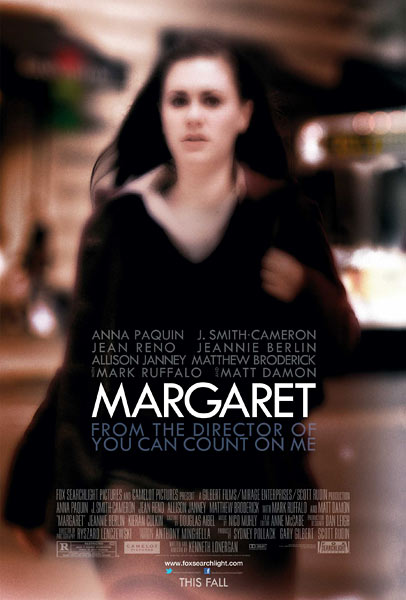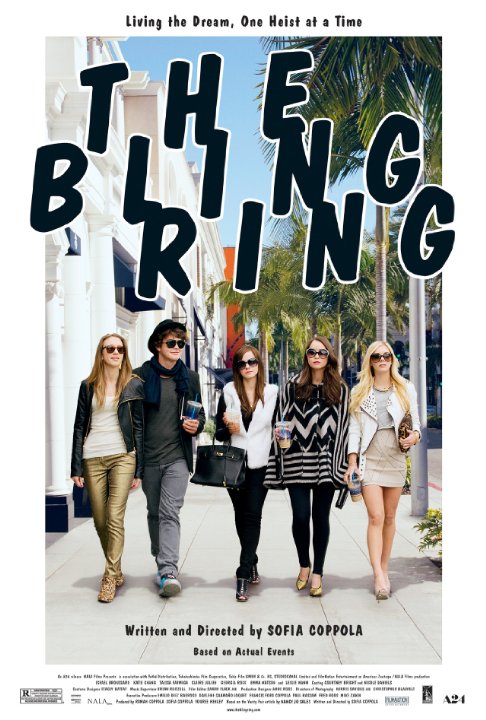Dearest Mildred: The mommy
stories of Joan Crawford
The curious thing about “Mildred Pierce,” one of the greatest films of the 1940s, is how much it dovetails with a much-later, widely panned film, “Mommie Dearest.”
Both have a lot to do with Joan Crawford. “Pierce” is probably her signature performance, if only because it produced her lone Oscar win (a story in itself). At the time of the film’s 1945 release, she was 41, and beautiful, directed by a once-skeptical giant, Michael Curtiz. Crawford was already enormously famous, as much for her rivalries and feuds (studios, directors, Pepsi Cola, Bette Davis) as her acting. (And maybe her eyebrows.) She would receive two more Academy Award nominations after “Pierce” and emerge, despite four marriages, as something of a gay icon. No human being in any profession really knows what his/her shelf life is until it happens (or doesn’t happen). Many probably assumed Crawford’s stardom was over by the 1940s. “Pierce,” a “runaway hit” with stellar reviews, according to the book Inside Oscar, almost certainly cemented her permanent fame, its success an indication that moviegoers would find this person fascinating as long as she could stand.
“Pierce” depicts a strong, self-made woman who can’t stop spoiling her daughter, to the detriment of both of them. It is beautifully over the top — a middle-age female restaurateur who suddenly acquires wealth faster than Jeff Bezos — and, almost shockingly nonchalantly, breezes over an enormous tragedy.
A full-page ad for “Mommie Dearest” in the Chicago Tribune, Oct. 9, 1981
“Mommie Dearest” depicts a self-made woman who can’t stop terrorizing her daughter, to the permanent detriment of both. It is hilariously over the top, taking divadom to levels it probably never had previously gone.
“Mildred Pierce” will forever be haunted by its title. From 1904 (the year of birth of Joan Crawford, whose real name is Lucille Fay LeSueur) to 1945 (the year of release of “Mildred Pierce”), the name “Mildred” slid from 9th most popular baby name to 93rd. The movie’s story of a persevering, middle-age mom, decades before “The Partridge Family” and “One Day at a Time,” was way ahead of its time, so much so that “Mildred” sounds like not a cutting-edge ’70s TV show but something your grandmother would watch. Nevertheless, “Mildred Pierce” is sexy noir.
Those old enough to appreciate “Pierce” in 1945 are probably the best ones to answer if it represented a certain kind of postwar longing. According to the Internet Movie Database, the film came out in October 1945, one of the earliest post-World War II releases. This story of greed and indulgence has as much to do with rationing and sacrifice as 1987’s “Wall Street.”
Maybe that’s where “Mommie Dearest” went wrong. Despite enormous wealth, Crawford is living small, a haggard woman trampling her unfortunate children in a hellhole of luxury. “Pierce” would have nothing to do with things such as substance abuse or mental illness. “Dearest” decides that alcoholism and possibly bipolar disorder or other mental illness are elements of the story but prefers the notion of a born tyrant and, not insignificantly, her Hollywood dream house. Were Faye Dunaway’s Crawford shown to be thriving, or disintegrating, as a result of her behavior, we would have powerful tragedy. But she isn’t, and we have camp. Roger Ebert bluntly declared in his opening sentence, “I can’t imagine who would want to subject themselves to this movie.” Enough have subjected themselves to this watchable camp to earn the distinction of cult classic.
It’s an important qualifier that “Mommie Dearest” was based largely on the book by Crawford’s daughter Christina published shortly after Crawford’s death; Joan never had the chance to defend herself. Many of her friends took issue with the book. Some sided with Christina. Director Frank Evans conceded to Roger Ebert that a star the magnitude of Crawford must’ve had “admirable qualities, like tenacity and courage.” Crawford died in 1977 at age 73, and not from remorse.
4 stars (Mildred Pierce)/3 stars (Mommie Dearest)
(June 2019)
“Mildred Pierce” (1945)
Starring Joan Crawford
as Mildred Pierce
♦
Jack Carson
as Wally Fay
♦
Zachary Scott
as Monte Beragon
♦
Eve Arden
as Ida Corwin
♦
Ann Blyth
as Veda Pierce
♦
Bruce Bennett
as Bert Pierce
♦
Lee Patrick
as Mrs. Maggie Biederhof ♦
Moroni Olsen
as Inspector Peterson
♦
Veda Ann Borg
as Miriam Ellis
♦
Jo Ann Marlowe
as Kay Pierce
♦
Butterfly McQueen as Lottie - Mildred’s Maid (uncredited)
Directed by: Michael Curtiz
Written by: Ranald MacDougall (screenplay)
Written by: James M. Cain (novel)
Producer: Jerry Wald
Executive producer: Jack L. Warner
Music: Max Steiner
Cinematography: Ernest Haller
Editing: David Weisbart
Art direction: Anton Grot
Set decoration: George James Hopkins
Makeup: Perc Westmore
“Mommie Dearest” (1981)
Starring
Faye Dunaway
as Joan Crawford
♦
Diana Scarwid
as Christina Crawford (Adult)
♦
Steve Forrest
as Greg Savitt
♦
Howard Da Silva
as L.B. Mayer
♦
Mara Hobel
as Christina Crawford (Child)
♦
Rutanya Alda
as Carol Ann
♦
Harry Goz
as Al Steele
♦
Michael Edwards
as Ted Gelber
♦
Jocelyn Brando
as Barbara Bennett
♦
Priscilla Pointer
as Mrs. Chadwick
♦
Joe Abdullah
as Captain ♦
Gary Allen
as Jimmy (Photographer) ♦
Selma Archerd
as Connie ♦
Adrian Aron
as Wedding Guest ♦
Xander Berkeley
as Christopher Crawford (Adult)
♦
Matthew Campion
as Actor in Soap (Bill)
♦
Carolyn Coates
as Mother Superior ♦
Jerry Douglas
as Radio Interviewer ♦
Margaret Fairchild
as Mother Superior (Orphanage) ♦
Phillip R. Allen
as Pepsi Executive #1 ♦
James Kirkwood
as Master of Ceremonies ♦
Michael D. Gainsborough
as Pepsi Executive #2 ♦
Matthew Faison
as Pepsi Executive #3 ♦
Peter Jason
as Pepsi Executive #4 ♦
Ellen Feldman
as Ginny ♦
Robert Harper
as David ♦
Cathy Lind Hayes
as Nurse ♦
Victoria James
as Photographer ♦
Dawn Jeffory
as Vera ♦
Virginia Kiser
as Beth Simpson ♦
S. John Launer
as Pepsi Chairman ♦
Russ Marin
as Funeral Director ♦
Nicholas Mele
as Assistant Director #2 ♦
Belita Moreno
as Belinda Rosenberg ♦
Warren Munson
as Lawyer ♦
Alice Nunn
as Helga ♦
Norman Palmer
as Male Guest ♦
David Price
as Tony ♦
Jeremy Scott Reinbolt
as Christopher Crawford (5 years) ♦
Michael Talbott
as Driver ♦
Arthur Taxier
as Decorator ♦
Joseph Warren
as Mr. Dodd ♦
Erica Wexler
as Susan ♦
Dick McGarvin
as Tour Bus Driver ♦
Brent Dunsford
as Fan ♦
Joseph Dypwick
as Fan ♦
Wendy Pitzer
as Fan ♦
David Sanderson
as Fan ♦
Ian Bruce
as Assistant Director ♦
Peter Paul Eastman
as Doctor
Directed by: Frank Perry
Written by: Christina Crawford (book)
Written by: Frank Yablans
Written by: Frank Perry
Written by: Tracy Hotchner
Written by: Robert Getchell
Producer: Frank Yablans
Executive producer: David Koontz
Executive producer: Terence O’Neill
Associate producer: Neil A. Machlis
Music: Henry Mancini
Cinematography: Paul Lohmann
Editing: Peter E. Berger
Casting: Nancy Klopper, Lynn Stalmaster
Production design: Bill Malley
Art direction: Harold Michelson
Set decoration: Richard C. Goddard
Costume design: Irene Sharaff
Makeup and hair: Kathryn Blondell (hair stylist: Ms. Dunaway), Claude Díaz (wig maker: Faye Dunaway), Lee Harman (makeup artist: Ms. Dunaway), Vivienne Walker, Charles H. Schram
Unit production manager: Neil A. Machlis
